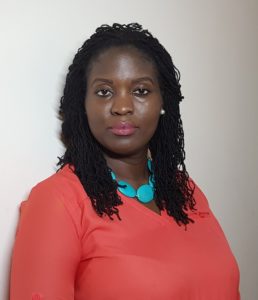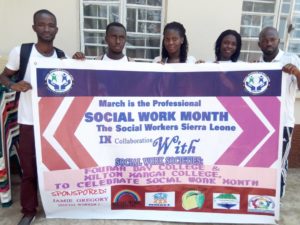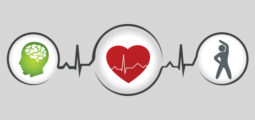MEET ARIANA

The need for social work in Sierra Leone.
The social welfare of our people in Sierra Leone has been on a steady decline. The young people are frustrated with the lack of opportunities and the older generation are overburdened. One thing is clear, both groups are UNHAPPY.
Ariana Diaries enjoys promoting habits that would develop into a healthy lifestyle. We are always looking for ways we can contribute to an improved holistic wellness in communities. As against the backdrop of the recently concluded celebrations we thought it fit to chat with someone who is trained to develop ways of working with people for better lives.
Ms. Memuna Stevens is a licensed social worker from the Ryerson University in Toronto, Canada with over 8 years of Human service experience in the community sector. Since her return to Sierra Leone in 2015 she has shown consistent demonstrations in her commitment to community development and health promotions principles by collaborating with community networks, community groups and International Organisations to supporting with the needed tools and resources needed to enlighten people on the need for and the benefits of social work.
Tell us about your career choice, the journey? When did you know you were destined for social work?
My journey was inspired by the need to contribute to the change I wanted to see in Sierra Leone after the civil war.
My mother, sister and I were privileged to flee to The Gambia and later Canada when the war broke out in Sierra Leone. My mum was instrumental in helping me choose a career by asking me to do an inner reflection and to list out my genuine interests, skills and characteristics. We matched what I had listed down with what we found in university brochures and Social Work was the perfect fit.
During some research, I came across and instantly subscribed to a Zulu philosophy -Ubuntu. Archbishop Desmond Tutu explained it as ‘my humanity is inextricably bound up in yours’. Seeing myself as part of the whole of humanity, I could not turn a blind eye or ignore social issues. Understanding that I am made up of the good and bad around me, forced me to realize that my actions have ripple effects.
Four years later, I graduated from Ryerson University in Toronto, Canada with a Bachelor of Social Work with honours, and have been able to work in the social service sector for over 8 years, utilizing my passion and skills for counseling, psychosocial support, crisis intervention/ management, advocacy, community development, workshop facilitation, and program management.
I knew I was destined for Social Work before my enrollment into University. My peers and adults came to me to talk, to listen, to mediate. I always made time, was empathetic, concerned, non- judgemental and listened to what people ‘did not say’. I used my intuition a lot and did everything from my heart. Sometimes it felt heavy and I cried with some people. I felt like a vault that kept secrets safe. However, I still remember the inner satisfaction I received each time somebody said ‘Thank you’ with a deep and genuine smile, or that I have shone a bright light in a dark phase of their life. I still live for those rewarding moments.
How would you describe the typical work environment in Sierra Leone, do you think it supports a holistic lifestyle?
I do not think a holistic lifestyle is supported. Some individuals experience certain life turmoil’s and really need to take at least a week off work to process things but are worried to take leave with the fear of losing their job. They may just take end up formulating an acceptable story just to have half a day off. It’s interesting how the physical is always given a priority while the emotional and mental are not deemed important.
In recent years, depression and mental illness among the youth is on the increase especially in the urban areas of Sierra Leone, what would you say are the main triggers? What would be your number one recommendation.
I think the social determinants of their health which include educational inequities and poverty, need to be addressed urgently. Addressing the symptoms of mental health and ignoring the root cause will not improve their health.
My recommendation will be to have a Technical and Vocational Education and Training (TVET) scholarship scheme where the government seeks to address the gaps that support public policy. The scheme will cover tuition and its related costs and upon graduation a job is guaranteed in order to fill in the job market gaps that will support the public policy.
This will address youth unemployment by aligning it with a socio-economic problem such as education, urban planning, road infrastructure etc. where they will build main and side roads using local products like clay and conduct urban planning and deal with waste management problems for example.
If you had the authority to pass a legislation supporting social problems in Sierra Leone, what challenge would it address and why?
I would pass a legislation that supports an educational reform to look at a standard (curricula) and quality of the schools (educational level of the teachers), while ensuring that every school has a guidance counselor to offer individual guidance counseling sessions to students that are focused on personal development, character building, teaching goal achievement, education progress evaluation, general conduct and personal support in everyday constraints.
This would prepare and mold individuals from the early stage, set them up for success and have better Sierra Leoneans generation after generation.
What do you describe as living a purposeful life?
Living a purposeful life is when you are aware of and motivated by your passion, talent and skills, and use them to make an impact in life and work and you get true joy from doing so.
What’s the biggest piece of advice you can give to young girls looking to start a career in social work?
Social Work should not be the next best option when you do not meet the requirement for your original course of study.
Social Work should be something you go into because:
- You have researched on the profession, reflected and concluded that you have the passion and drive for Social Work
- You have the qualities and characteristics of a social worker (selflessness, empathy, patience, a caring nature, effective communication, organization skills, analytical skills, professional and good judgement, resilience to stress and good time management).
- You want change the world person by person
Celebrate the small changes because they lead to bigger transformations and you are there to work and fill gaps that will contribute to a healthier nation.
Do you think peer mentoring can be used as an effective tool in alleviating teenage pregnancy and the rate of school drop-outs?
Yes. I definitely think so. It has been tried and tested.
When teenagers have an individual, they can trust or they feel comfortable to speak with ,they get objective and realistic views from and look up to as a role model it has a great impact.
Briefly tell us why you think there is a need to prioritize social work in Sierra Leone?
This question brings out a whirlpool of emotions for me. I am saddened and angry that with the multiple layers of issues that our nation has, Social Workers are not a priority.
It reminds me of the advocacy that needs to be done on policy level, and I end up consoling myself and stay hopeful because in all honesty, Social Work is a fairly new profession in Sierra Leone and its importance is slowly getting to the forefront.
Social Work needs to be prioritized because:
After the civil war an effective assessment was not carried out on the mental health impact of the victims and perpetrators of the war.
After the Ebola virus epidemic, we have approximately 12,000 orphans that I believe have psychosocio- economic issues that need to be addressed.
After the mudslide incident there still lacks adequate response and support from the decision makers.
Some victims cannot recount their story from the war without crying even though it has been over the period of 10 years since they experienced a certain incident. A lot of healing needs to take place.
Social work techniques provide a rich source of intervention strategies. Social workers help to put together the societal fabric. They need to be well trained, employed and empowered to tackle all the layers social of issues we currently have and to bring about the needed social change and a healthier nation.







Memuna Stevens. . . What a great piece, thanks for always inspiring me. To the article, I think every bit of what she said it’s true, we know these problems exist, but the policy makers don’t even know who to do the work. You the good guys (Social workers) need to unearth yourself and let this nation know.
But like she said, Social work is fairly a new discipline, however the fact that we have people like u popping up the recognition, I see hope for it.
Thank u.
Thanks Memuna Stevens. Social Work is a new profession in Sierra Leone which needs time to grow so that the people of Sierra Leone can really understand the roles we play in society.
It’s our responsibility to work towards that and make a positive change. #Teamwork#
Great piece and I agree with Memuna. Undiagnosed and untreated trauma is a contributing factor as well.
I am a BSW social worker. I’ve huge experience in social work and I’m very passionate about it. I’m so proud God chose me to be a social worker. I’ve experience working as a hospital social worker at the Kissy Psychiatric hospital, school social worker at the Family Homes Movement School, Political Assistant social worker at the U.S Embassy, and Child Social Worker at Save the Children etc. I recently read the revised mental health policy 2019 and there’s not a mentioned of one social worker, we are not recognized by the state. I’m really passionate about Social Work. I’ll be interested to work in all capacity as a social worker to change lives.